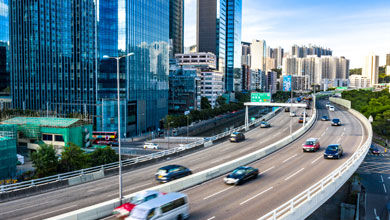

May 2, 2023 | Patti Zullo, Senior Director, Smart Cities Solutions, Spectrum

Over the past five years, spending on smart city initiatives has more than doubled, signaling that cities are quickly recognizing the value of these solutions.

With the rise of food delivery apps and the popularity of curbside pick-up, smart curb management is an area of growing interest for municipalities. Every city has curbs, and residents, businesses and tourists can all benefit from curb management solutions. Cities can create plans – pricing models, parking hours, loading zone allocations, etc. – to manage their most-desired curb spaces. For example, cities with greater insight into the use of these vital parts of the infrastructure are learning how curb management might drive additional revenue, enhance traffic flow and make the overall travel experience within the city a safer and more positive experience.
The primary benefits of curb management include safety – of drivers, couriers, cyclists and pedestrians – and reducing traffic congestion, by preventing gridlock and illegal parking. With a smart solution and secure, reliable connectivity in place, ‘near misses’ decrease and people can more easily travel, park and explore the city. Effective curb management allows smooth movement throughout the city, reducing traffic due to illegal parking/loading and making finding parking easier. While this directly benefits the residents and businesses, it also makes the city more desirable for tourists. If cities have a system to maximize the efficiency of parking and traveling throughout the city, tourists are more likely to return.
Getting started
As cities explore smart curb solutions and build their partner ecosystem, they should identify a reliable network partner to provide the foundational secure connectivity needed to gather and utilize data from across the city, keeping in mind that a smart city is built on many different types of connectivity. Having this advisor in place can help prevent one of the biggest stumbling blocks to implementing smart initiatives – simply knowing how to get started. Advisors can help cities more easily gather data to understand trends and current issues, utilize the data to develop the most effective solution and ensure all key stakeholders are involved.
Gathering and using data across the city
Curb management solutions are not one-size-fits-all; it is important to understand how residents are using specific curbs. By deploying robust, secure connectivity, video technology and/or sensors, cities can collect data to inform solutions, including average parking time, busiest curb times, and which drivers (citizens, businesses, delivery companies, etc.) are utilizing the curb the most. This data should be collected throughout the city core to give a holistic view of how curbs are being used in different areas. Beyond data directly related to the curb, cities can also explore traffic patterns and pedestrian data to create a comprehensive solution. Once the data has been collected and analyzed, cities must take the findings and ideate a curb solution. For example, the data may show that the curb is seeing the highest utilization on the weekends, so cities can adjust the parking time and fees dynamically to change between the weekdays and weekends.
Getting stakeholders involved
Key stakeholders should be involved throughout the process. When looking at curb management solutions, it is important for the city to obtain many perspectives, such as from residents, the public works/parking group (including private parking garages), the traffic bureau (police or other parking enforcement agency), the economic development team, and businesses that may be impacted. While there is likely no solution that will appease all stakeholders, it is important to understand their points of view to determine how the curb might best be used. For instance, the economic development team may reveal that a specific section of the city is undergoing a revitalization and the empty buildings will soon be filled with businesses. This revelation would have a direct impact on curb usage in that area and may have otherwise been ignored had the stakeholders not been involved in the conversations before the solution is rolled out.
The future of curb management provides an opportunity to tap emerging technologies like artificial intelligence and machine learning for real-time insights. With these technologies and reliable networking infrastructure, cities will be able to create a dynamic curb solution with different times permitted for parking, varied pricing for parking and more. Flexible and scalable solutions allow cities to create a curb management program that can grow and evolve, reflecting and adapting to changes and continuing to best meet the needs of its citizens.

"Curb management include[s] safety – of drivers, couriers, cyclists, and pedestrians [...]"
Speak WITH a Spectrum Smart Cities Expert



